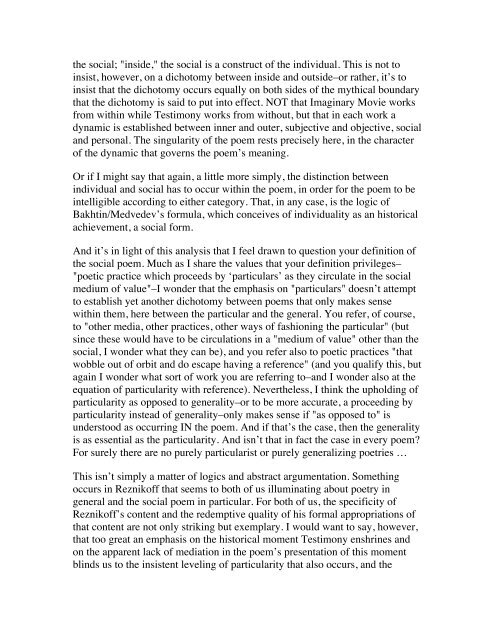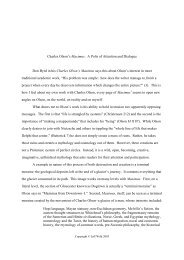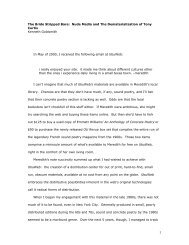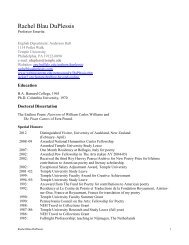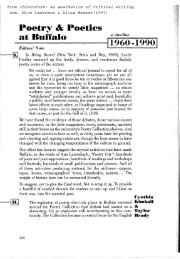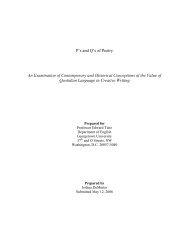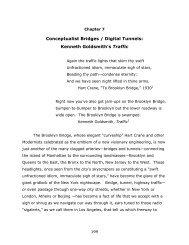Preface - Electronic Poetry Center
Preface - Electronic Poetry Center
Preface - Electronic Poetry Center
Create successful ePaper yourself
Turn your PDF publications into a flip-book with our unique Google optimized e-Paper software.
the social; "inside," the social is a construct of the individual. This is not to<br />
insist, however, on a dichotomy between inside and outside–or rather, it’s to<br />
insist that the dichotomy occurs equally on both sides of the mythical boundary<br />
that the dichotomy is said to put into effect. NOT that Imaginary Movie works<br />
from within while Testimony works from without, but that in each work a<br />
dynamic is established between inner and outer, subjective and objective, social<br />
and personal. The singularity of the poem rests precisely here, in the character<br />
of the dynamic that governs the poem’s meaning.<br />
Or if I might say that again, a little more simply, the distinction between<br />
individual and social has to occur within the poem, in order for the poem to be<br />
intelligible according to either category. That, in any case, is the logic of<br />
Bakhtin/Medvedev’s formula, which conceives of individuality as an historical<br />
achievement, a social form.<br />
And it’s in light of this analysis that I feel drawn to question your definition of<br />
the social poem. Much as I share the values that your definition privileges–<br />
"poetic practice which proceeds by ‘particulars’ as they circulate in the social<br />
medium of value"–I wonder that the emphasis on "particulars" doesn’t attempt<br />
to establish yet another dichotomy between poems that only makes sense<br />
within them, here between the particular and the general. You refer, of course,<br />
to "other media, other practices, other ways of fashioning the particular" (but<br />
since these would have to be circulations in a "medium of value" other than the<br />
social, I wonder what they can be), and you refer also to poetic practices "that<br />
wobble out of orbit and do escape having a reference" (and you qualify this, but<br />
again I wonder what sort of work you are referring to–and I wonder also at the<br />
equation of particularity with reference). Nevertheless, I think the upholding of<br />
particularity as opposed to generality–or to be more accurate, a proceeding by<br />
particularity instead of generality–only makes sense if "as opposed to" is<br />
understood as occurring IN the poem. And if that’s the case, then the generality<br />
is as essential as the particularity. And isn’t that in fact the case in every poem?<br />
For surely there are no purely particularist or purely generalizing poetries …<br />
This isn’t simply a matter of logics and abstract argumentation. Something<br />
occurs in Reznikoff that seems to both of us illuminating about poetry in<br />
general and the social poem in particular. For both of us, the specificity of<br />
Reznikoff’s content and the redemptive quality of his formal appropriations of<br />
that content are not only striking but exemplary. I would want to say, however,<br />
that too great an emphasis on the historical moment Testimony enshrines and<br />
on the apparent lack of mediation in the poem’s presentation of this moment<br />
blinds us to the insistent leveling of particularity that also occurs, and the


